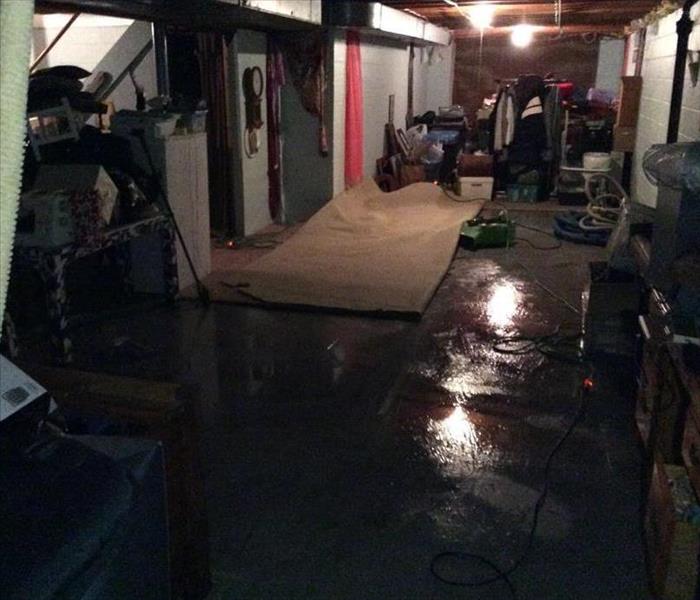Water Damage Isn't Always From a Storm
12/11/2019 (Permalink)
 A broken water heater caused the water damage in this basement, affecting the entire floor and contents.
A broken water heater caused the water damage in this basement, affecting the entire floor and contents.
When people think about water damage, often, especially in our area close to the Jersey Shore, they think of major storms like Hurricane Sandy or coastal flooding. In reality, most water damage is “man made.”
The majority of water damage in homes stems from leaking or broken pipes, pipe fittings or caps, burst or leaking water heaters, appliances, kitchen and bath fixtures and sump pumps.
For pipes, these simple steps can deter major issues once winter weather settles and it becomes cold.
OUTDOORS:
- Wrap outside faucets.
- Caulk around pipes where they enter the house.
- Disconnect garden hoses.
- Drain in-ground sprinkler systems.
INDOORS:
- Check your home for places where water supply lines are not heated (e.g., in a basement or garage).
- Let a stream of water run if the temperatures dip below freezing.
- Open cupboard and vanity doors in the kitchen or bathroom.
- Keep the thermostat set to the same temperature both during the day and at night. By temporarily suspending the use of lower nighttime temperatures, you may incur a higher heating bill, but you can prevent a much more costly repair job if pipes freeze and burst.
- Shut off and drain your water system if you are leaving the home for several days or more, and set your thermostat a temperature no lower than 55° F.
Water heaters, on average, should last anywhere between 8 to 12 years. A broken water heater can leave over 50+ gallons of water all over your house, depending on how big it is.
How can you tell if it’s time to change your water heater? There are definitely signs.
- If your water heater is getting up in years, it may be time to replace it before it breaks.
- Tinted water coming from your hot water tap means there may be rust in your water heater, which is a possible indicator your hot water heater is showing signs of wear and may start to leak.
- Gurgling or popping noises coming from your water heater are caused by the buildup of hard water sediment heating up and exploding inside your water heater tank.
- Look around the base of your hot water heater for dampness. This may be a symptom of a slow or intermittent leak.
- If you have no hot water while using your hot water tap, it may be a sign that your water heater needs to be checked out.
- If you see a puddle around the base of your hot water heater, immediate action should be taken to replace it.
To save yourself and your home from a sewage backup, here’s some advice to keep in mind.
- Keep your drains clear of clogging. Don’t flush items down your toilet that can cause build up in the pipes, such as diapers, sanitary napkins, or thick waste. Also, don’t get rid of grease down the sink, as grease can harden within the pipes and then collect other waste, creating a major clog.
- Conduct regular inspections of all the pipes and valves in your home and make sure they are well maintained.
- Don’t plant trees too close to the sewer lines, as over time the roots can grow and damage the pipes.
Keep a working sump-pump on hand, just in case.
And speaking of sump pumps….. a sump pump is designed to help you prevent water damage, but if the sump pump itself fails, you’re in trouble. In order to keep your sump pump in good running order, it’s smart to service it at least once or twice a year. You can do this yourself by pouring a bucket of water into the sump pump basin to make sure it’s working properly. You may want to consider replacing your sump pump about every 7 years depending on use.
Even with all this preparation, accidents can still happen. In that case, calling SERVPRO of Eatontown/Long Branch immediately will ensure that any water damage will be cleaned by professional technicians and your home will be restored “Like it never even happened.”





 24/7 Emergency Service
24/7 Emergency Service